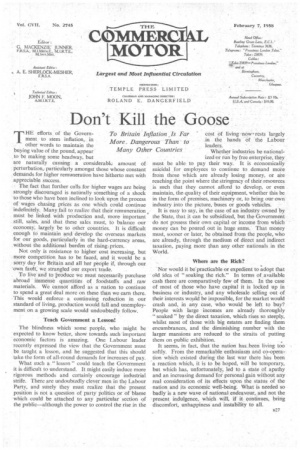Don't Kill the Goose
Page 37

If you've noticed an error in this article please click here to report it so we can fix it.
THE efforts of the Government to stern inflation, in other words to maintain the buying value of the pound, appear• to be making some headway, but are naturally causing . a considerable amount of perturbation, particularly amongst those whose constant demands for higher remuneration have hitherto met with appreciable. success.
The fact that further calls for higher wages are being strongly discouraged is naturally something of a shock to those who have been inclined to look upon the process • of •wages chasing prices as one which could continue indefinitely. Many fail to realize that their remuneration must be linked with production and, more important still, sales, and that these sales must, to balance our economy, largely be to other countries. It is difficult enough to maintain and develop the overseas markets for our goods, particularly in the hard-currency areas, . without the additional burden of rising prices.
Not only is resistance to higher cost increasing, but • More competition has to be faced, and it would be a • scirry day for Britain and all her people if, through our -own fault; we strangled our export' trade. To live and to produce we must necessarily purchase abroad immense quantities of foodstuffs and raw materials. We Cannot afford as a nation to continue to spend a great deal more on these than we earn there.
• This would . enforce a continuing reduction in our standard of living, production would fall and unemployment on a growing scale would undoubtedly follow.
Teach Government a Lesson!
The blindness which some people, who • might be expected to know better, show towards such 'important economic factors is amazing. One. Labour leader recently expressed the view that the Government must be taught. a lesson, and he suggested that this should take. the form of all-round demands for increases of pay.
What such a " lesson " could teach the Government it is difficult to understand. It might easily induce more rigorous methods and certainly encourage industrial strife. There are undoubtedly clever men in the Labour Party, and surely they must realize that the present position is not a question of party politics .;ff of blame which could be attached to any particular section of the public—although the power to control the rise in the cost Of living -now rests largely in the hands of the Labour leaders.
Whether industries be nationalized or run by free enterprise, they must be able to pay their way. It is economically suicidal for employees to continue to demand more from those which are already losing money, or are reaching the point where the stringency of their resources is such that they cannot afford to develop, or even maintain, the quality of their equipment, whether this be in the form of premises, machinery or, to bring our own industry into the picture, buses or goods vehicles.
It is easy to say, in the case of an industry owned by the State, that it can be subsidized, but the Government do not possess their own capital or income from which money can be poured out in huge sums. That money must, sooner or later, be obtained from the people, who are already, through the medium of direct and indirect taxation, paying more than any other nationals in the World.
Where are the Rich?
Nor would it be practicable or expedient to adopt that • old idea of "soaking the rich." In terms of .available cash there are comparatively few of them. In the case of most of those who have capital it is locked up in business or industry, and any wholesale selling out of their interests would be impossible, for the market would crash and, in any case, who would be left to buy? People with large incomes are already thoroughly " soaked " by the direct taxation, which rises so steeply, whilst most of those with big estates are finding them encumbrances, and the diminishing number with the larger mansions are reduced to the straits of putting them on -public exhibition.
It seems, in fact, that the nation has. been living too softly. From the remarkable enthusiasm and co-opera. tion which existed during the last war there has been a reaction which, it is to be hoped, will be temporary, but which has, unfortunately, led to a state of apathy and an increasing demand for personal gain without any real consideration of its effects upon the status of the nation and its economic well-being. What is needed so badly is a new wave of national endeavour, and not the present indulgence, which will, if it continues, bring discomfort, unhappiness and instability to all.
































































































































